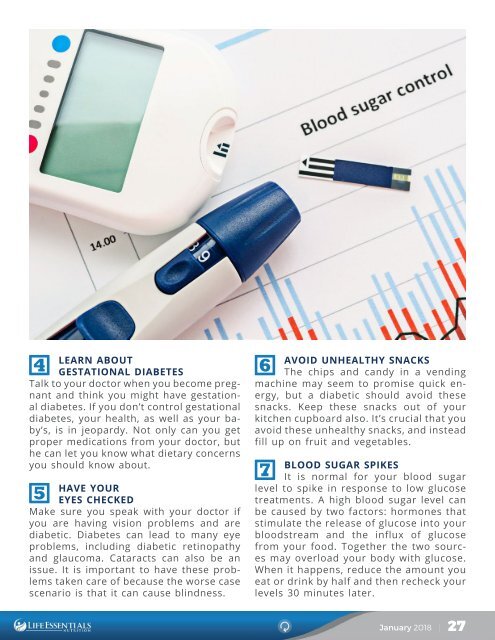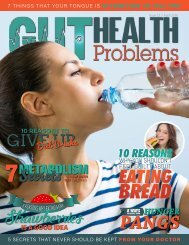Life Essentials Magazine January 2018
In the January 2018 issue of Life Essentials Magazine, get ready to fight depression, deal with arthritis, snore less and sleep better, and more. I hope you had a wonderful Christmas and are ready to embark into the new year. Our team has some exciting things in store for you, so stay tuned.
In the January 2018 issue of Life Essentials Magazine, get ready to fight depression, deal with arthritis, snore less and sleep better, and more. I hope you had a wonderful Christmas and are ready to embark into the new year. Our team has some exciting things in store for you, so stay tuned.
You also want an ePaper? Increase the reach of your titles
YUMPU automatically turns print PDFs into web optimized ePapers that Google loves.
4<br />
LEARN ABOUT<br />
GESTATIONAL DIABETES<br />
Talk to your doctor when you become pregnant<br />
and think you might have gestational<br />
diabetes. If you don’t control gestational<br />
diabetes, your health, as well as your baby’s,<br />
is in jeopardy. Not only can you get<br />
proper medications from your doctor, but<br />
he can let you know what dietary concerns<br />
you should know about.<br />
5<br />
HAVE YOUR<br />
EYES CHECKED<br />
Make sure you speak with your doctor if<br />
you are having vision problems and are<br />
diabetic. Diabetes can lead to many eye<br />
problems, including diabetic retinopathy<br />
and glaucoma. Cataracts can also be an<br />
issue. It is important to have these problems<br />
taken care of because the worse case<br />
scenario is that it can cause blindness.<br />
6<br />
AVOID UNHEALTHY SNACKS<br />
The chips and candy in a vending<br />
machine may seem to promise quick energy,<br />
but a diabetic should avoid these<br />
snacks. Keep these snacks out of your<br />
kitchen cupboard also. It’s crucial that you<br />
avoid these unhealthy snacks, and instead<br />
fill up on fruit and vegetables.<br />
7<br />
BLOOD SUGAR SPIKES<br />
It is normal for your blood sugar<br />
level to spike in response to low glucose<br />
treatments. A high blood sugar level can<br />
be caused by two factors: hormones that<br />
stimulate the release of glucose into your<br />
bloodstream and the influx of glucose<br />
from your food. Together the two sources<br />
may overload your body with glucose.<br />
When it happens, reduce the amount you<br />
eat or drink by half and then recheck your<br />
levels 30 minutes later.<br />
<strong>January</strong> <strong>2018</strong> |<br />
27

















